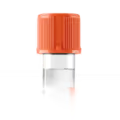Do I need a Monocytes, Absolute test?
Feeling run down, fighting off infections more often, or dealing with unexplained inflammation? Could your immune system be struggling, and might measuring your monocytes reveal what's happening?
Monocytes are white blood cells that fight infections and clear damaged tissue. Your absolute monocyte count shows whether your immune system is responding appropriately to threats or if something needs attention.
Testing your monocytes gives you a vital snapshot of your immune health, helping pinpoint whether chronic infections or inflammation are draining your energy. It's the essential first step to personalizing your health plan and making lifestyle choices that strengthen your body's defenses.
Method: FDA-cleared clinical laboratory assay performed in CLIA-certified, CAP-accredited laboratories. Used to aid clinician-directed evaluation and monitoring. Not a stand-alone diagnosis.

A derived biomarker is a value that is calculated from other directly measured biomarkers rather than being measured directly in the lab.
Get tested with Superpower
If you’ve been postponing blood testing for years or feel frustrated by doctor appointments and limited lab panels, you are not alone. Standard healthcare is often reactive, focusing on testing only after symptoms appear or leaving patients in the dark.
Superpower flips that approach. We give you full insight into your body with over 100 biomarkers, personalized action plans, long-term tracking, and answers to your questions, so you can stay ahead of any health issues.
With physician-reviewed results, CLIA-certified labs, and the option for at-home blood draws, Superpower is designed for people who want clarity, convenience, and real accountability - all in one place.
Key benefits of Monocytes, Absolute testing
- Measures your infection-fighting monocytes to assess immune system health and response.
- Flags chronic inflammation linked to autoimmune disease, infection, or tissue injury.
- Spots elevated counts that may signal blood disorders or bone marrow conditions.
- Guides treatment decisions for infections, inflammatory diseases, and immune-related disorders.
- Tracks immune recovery after illness, chemotherapy, or steroid therapy.
- Clarifies unexplained fatigue, fever, or swollen lymph nodes with immune context.
- Best interpreted with complete blood count and your clinical symptoms.
What is Monocytes, Absolute?
Monocytes are large white blood cells that circulate in your bloodstream as part of your immune system. They originate in your bone marrow from stem cells and are released into circulation as relatively immature cells. An absolute monocyte count measures the actual number of these cells per unit of blood, rather than just their percentage among all white blood cells.
Your body's cleanup and defense crew
Monocytes serve as mobile sentinels that patrol your blood for about one to three days before migrating into tissues. Once they leave the bloodstream and enter organs like your lungs, liver, spleen, or skin, they mature into specialized cells called macrophages and dendritic cells. These transformed cells become your body's professional cleanup crew and alarm system.
From surveillance to action
The absolute monocyte count reflects your body's capacity to respond to infection, clear damaged tissue, and coordinate immune responses. Monocytes engulf bacteria, dead cells, and debris while also releasing chemical signals that recruit other immune cells. They bridge your innate and adaptive immunity, making them essential players in both immediate defense and long-term immune memory.
Why is Monocytes, Absolute important?
Absolute monocyte count measures the number of monocytes circulating in your blood per microliter. These large white blood cells are your body's frontline cleanup crew and immune sentinels. They patrol for infection, migrate into tissues to become macrophages, and orchestrate inflammation and tissue repair across every organ system.
Your body's roaming repair team
Normal ranges typically fall between 200 and 800 monocytes per microliter, with optimal values sitting comfortably in the middle. Values toward the lower end are generally fine as long as other immune cells function well. Monocytes work closely with lymphocytes and neutrophils to maintain immune balance.
When counts drop too low
Low monocyte counts can signal bone marrow suppression, certain infections, or autoimmune conditions that impair white blood cell production. You may experience frequent infections, slow wound healing, or unexplained fatigue. In rare cases, very low counts appear with specific blood disorders or after chemotherapy.
When counts climb too high
Elevated monocytes often reflect chronic infection, inflammatory diseases like rheumatoid arthritis or inflammatory bowel disease, or recovery from acute illness. High counts can also appear with certain blood cancers or chronic stress states. Symptoms may include persistent fever, joint pain, or unexplained weight loss.
The immune surveillance network
Monocyte levels offer a window into your immune system's activation state and your body's response to hidden inflammation or infection. Persistent abnormalities warrant investigation, as they can signal underlying conditions affecting cardiovascular health, metabolic function, and long-term disease risk.
What do my Monocytes, Absolute results mean?
Low monocyte counts
Low values usually reflect reduced production in the bone marrow or increased consumption during active infection. This can occur with certain bone marrow disorders, after chemotherapy, or with long-term corticosteroid use. Very low monocyte counts may impair the body's ability to clear debris, fight certain infections, and initiate tissue repair. Some people naturally run on the lower end without clinical consequence.
Optimal monocyte counts
Being in range suggests healthy bone marrow function and balanced immune surveillance. Monocytes circulate briefly before migrating into tissues to become macrophages, where they clear pathogens, dead cells, and support wound healing. Optimal values typically sit in the mid to lower portion of the reference range, reflecting steady turnover without excessive inflammation.
High monocyte counts
High values usually reflect an active immune response to infection, inflammation, or tissue injury. Monocytes increase during chronic bacterial infections, recovery from acute illness, autoimmune flares, and certain cancers. Persistently elevated counts may signal ongoing inflammation, chronic infection, or a myeloproliferative disorder. Transient elevations are common during viral recovery and stress responses.
Context and interpretation
Monocyte counts vary with acute illness, stress, pregnancy, and medications including steroids and immunosuppressants. Interpretation depends on the clinical picture and trends over time. Isolated mild elevations are often benign, while marked or persistent changes warrant further evaluation alongside other white blood cell types and clinical symptoms.

.svg)









.avif)
.avif)


